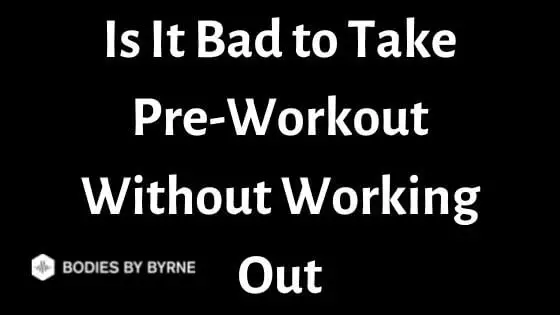Pre-workouts are one of the most popular fitness supplements on the market.
They come in a variety of forms – from tablets to powders, to drinks. They’re designed to give an extra boost of energy before a workout and may help to improve concentration, stamina, and overall gains.
They do this through the variety of ingredients that they contain. Although each product is slightly different, common ingredients in pre-workouts include caffeine, L-glutamine, BCAAs, and creatine.
Pre-workouts are designed to be taken before a workout (hence the name), however, sometimes people take pre-workout without working out afterward and we’re often asked about whether it’s bad to do this.
So, below I’ll answer the question: is it bad to take pre-workout without working out?
Also – check out this video where a doctor explains everything you need to know about pre-workout:
Table of Contents
Is It Bad to Take Pre-Workout Without Working Out?
Pre-workout is designed to be taken before a workout so it shouldn’t be taken without working out. This is because taking pre-workout without working out increases the risk of side effects. It also increases the likelihood of tolerance which makes pre-workout less effective in the long term.
Pre-workouts are designed to be taken before a workout, that’s why they’re called pre-workout. Really, if you aren’t working out, then is it even a pre-workout supplement?
Pre-workouts containing stimulants like caffeine in particular provide a significant boost of energy, making you feel motivated and energized to work out. They’re supposed to be taken to help you get through difficult workouts, so they should be taken sparingly.
Taking pre-workout without working out then isn’t recommended and taking pre-workouts inappropriately, meaning when you don’t need them, can have potential downsides.
The main downsides are: side effects, tolerance, and dependence. I’ve expanded on each of these in the next sections.
Side effects
The first downside of taking pre-workout without working out is the side effects. Pre-workout supplements can cause a variety of side effects depending on their ingredients and dosage.
Some of the more commonly reported side effects are insomnia, heart palpitations, and gastrointestinal symptoms like nausea and diarrhea.
Taking pre-workout without working out means you’re risking these side effects without any benefit on a workout.
For example, many pre-workouts contain high doses of stimulants like caffeine. Whilst caffeine provides a boost of energy to get through a tough workout, it can cause side effects like insomnia, heart palpitations, and anxiety, to name a few.
So, if you’re taking pre-workout without working out then you aren’t using up this extra energy. As a result, you’re risking these side effects without the potential benefit of stimulants on your workout.
Tolerance
The second downside to taking pre-workout without working out is tolerance. Tolerance happens when you consistently take pre-workouts as your body becomes used to these ingredients.
This tolerance usually develops towards the stimulants pre-workouts contain, Although it can also happen with other ingredients like beta-alanine.
Related – Can you build a tolerance to pre-workout
Tolerance occurs as the cells in your body become desensitized to the ingredients over time.
Usually, it takes about 4-6 weeks of consistently using pre-workout for this to occur. After this time, people start to notice that their pre-workout just doesn’t hit in the same way anymore and they may feel like it has little, or no, effect.
So if you’re taking pre-workout without working out, you’re increasing the likelihood of becoming tolerant to these products. This is also being done without any benefit to your workout.
To avoid becoming tolerant it’s best not to take pre-workout consistently. Instead, pre-workout should be used sparingly to get through tough workouts. This way your body isn’t regularly being exposed to these ingredients, which helps to stop it from developing a tolerance to them.
See also – Why is you’re pre-workout not working
Dependency
If you’re not planning to work out but still feel like you need to take a pre-workout then it’s important to ask yourself why.
With the exception of caffeine, most pre-workouts don’t contain ingredients that are addictive. But that doesn’t mean people don’t become dependent on them.
If you consistently use pre-workouts then you might feel like you can’t go without them, which creates a mental dependence on these supplements.
Obviously, this mental dependence is something you want to avoid. In order to avoid it, it’s important not to rely on pre-workouts. You can do this by only using them sparingly.
Also, as I mentioned, the caffeine in pre-workouts is addictive. This means that you might feel the need to take pre-workout even on rest days just to get that caffeine fix.
As pre-workouts usually contain high doses of caffeine you may feel tired on days you don’t take them. As I’ve discussed already, caffeine has a range of side effects so you don’t want to be hooked on high amounts of caffeine.
To avoid becoming dependent on pre-workout then they should be taken sparingly.
By only using pre-workout on days when you’re doing a tough workout you limit the amount you’re consuming. This helps to prevent becoming mentally dependent on these products. It also helps to avoid becoming hooked on high levels of caffeine.
What Happens If You Take Pre-Workout Without Working Out?
To be clear, it isn’t a bad thing to take pre-workout without working out. The main downside that we’ve not yet discussed is the waste of time and money that comes with taking a pre-workout without training.
Pre-workouts impact mental focus and energy levels but if you take them casually, you’ll not only be messing up your natural energy levels and mood but you’ll then risk impacting the future potency and effects of a pre-workout when you need it most – for training!
Pre-workout shouldn’t be taken without working out. This is because taking pre-workout incorrectly (such as without working out) can lead to serious side effects like heart palpitations, increased blood pressure, and insomnia.
As I mentioned before, pre-workouts are a good way of getting a boost of energy before a workout but they come with a risk of side effects. These side effects can be serious and dangerous to health. For example, they can cause high blood pressure, insomnia, and in rare cases cardiac arrest.
So, pre-workout supplements shouldn’t be taken incorrectly due to these potential side effects. You should follow the correct dosage and the instructions for taking them that are included on the packaging.
As well as experiencing side effects, taking a pre-workout without working out increases the likelihood of becoming tolerant to your pre-workout. As I’ve discussed, tolerance occurs when you regularly consume pre-workouts as your body becomes desensitized to the ingredients.
This is why I’d only recommend taking a pre-workout if you are going to workout afterward.
Is It Bad to Take Pre-workout Everyday?
Linked to the above, taking pre-workout without working out will have more downsides than benefits. Therefore, this raises the question of is it bad to take pre-workout everyday?
While it’s not bad to take pre-workout every day, the main issue of doing this is that you’ll feel diminishing effects through repeated use. Most people need to cycle stimulant-based supplements in order to stop them from becoming tolerant to the stimulant-inducing ingredients.
If you take a pre-workout every day, you’ll eventually need to keep increasing the dosage you consume to feel the same effects (like increased energy and focus).
Caffeine is the main ingredient you’ll start to build a tolerance to but there are countless other ingredients that will diminish in terms of the effects you feel.
For maximum potency and benefit, you should use pre-workout sparingly. Only using a pre-workout before a heavy leg session or after a long day of work or a night shift means you’ll reap the maximum benefit from it.
See also – How to avoid pre-workout addiction
If you take pre-workout too frequently, you’ll need to take higher doses in order to feel any effects and this exponentially increases the risks and side effects that could occur. Therefore, try not to consume a pre-workout every day.
Alternatively, you could potentially consume a non-stimulant pre-workout every day as these won’t result in tolerance or dependency like a stimulant pre-workout will.
Final Thoughts
A pre-workout is a supplement that is designed to be taken before you go to the gym and train. The name suggests this but because of the stimulating and addictive effects that you get, the temptation is there to take pre-workouts even without working out.
For maximum effectiveness, you shouldn’t take a pre-workout without working out. This is because you’ll become tolerant to the ingredients and they will then become less effective when supplementing them before you work out in the future.
Pre-workouts are highly stimulating so you don’t want to put your body through unnecessary stress by stimulating your nervous system on days when you aren’t training and need to rest/recover.
Alternatively, if you want an energy boost each day then you can consider taking an energy drink instead of a pre-workout. Energy drinks will have similar ingredients but with lower doses meaning you won’t build up as much of a tolerance when taking these ingredients.

Check out – Coffee vs pre-workout for the gym
